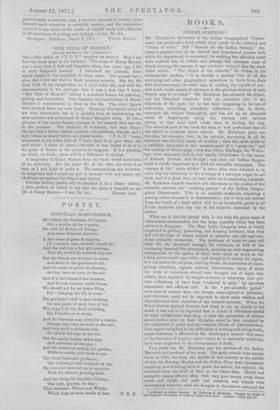"HER TITLE OF HONOUR."
[TO THE EDITOR OP Tilia "SPIRIT/MR.1
Sia,—The letter of "'1'. L. P." requires an answer. May I say how the book came to be written ? The story of Henry Martyn was a story that I had half forgotten when, two years ago, I fell in with Sargent's memoir. I borrowed the journals, from which chiefly it was compiled, to learn more. The memoir has a glow that I did not find in those personal records. But the life took hold of my imagination as a most noble life, and with the announcement in the prologue that it was a true tale I wrote "Her Title of Honour," taking a novelist's licence for painting, setting, and accessories. The character and convictions of Henry Martyn I endeavoured to draw to the life. The other figures were evolved from my own fancy. Eleanour Trevelyan's story is not true historically, but it is morally true, as representing the most pathetic and protracted of Henry Martyn's trials. It was a glimpse of this tender human interest in the memoir that sent me to the journals. The skeleton of incidents, and that Henry Martyn had a father, sisters, masters, schoolfellows, friends, and a lady whom he dearly loved, are literal truths. " T. L. P. "twice announces in his letter that all I have done is to give them life and colour ; I claim no more,—whether it was lawful to do it in the guise of fiction is the question he suggests. It is a question on which, no doubt, there will be a difference of opinion.
A biography of Henry Martyn from my hand would have been of no authority. For the inner life of the 'Iran, my story is as true as I had light to make it. The surroundings are, however, so imaginary that I could not put it forward with real names, nor challenge acceptance for it'as a real history.
Perhaps literary justice will be satisfied if, in a future edition, a plain preface be added to say that the story is founded on the life of Henry Martyn.—I am, Sir, &c., HOWIE LEE.






























 Previous page
Previous page